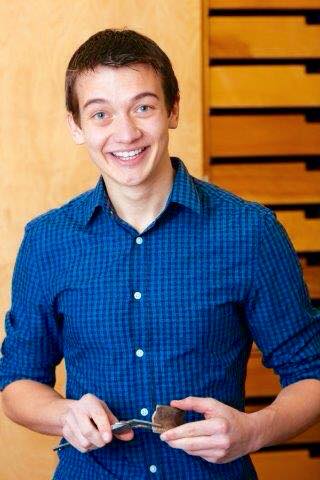Mike Lockman
May 8, 2015

Mike Lockman
Colleges: Liberal Arts and Honors College
Majors: Anthropology & Psychological Sciences
Why did you choose Purdue?
The Department of Anthropology was founded in 2008, and was only three years old when I enrolled, so it seemed like an exciting an opportunity to be at Purdue and grow with the Department. Secondly, Purdue offers all of the benefits of a large, research-focused institution while lending the atmosphere of a relatively smaller campus. And lastly, and perhaps most importantly, the education at Purdue is world-class. One would be hard-pressed to find similar institutions as focused on undergraduate learning as Purdue.
What is your passion and why do you do what you do?
My passion is archaeology! I am content with engaging in the discipline simply for the pursuit of augmenting our knowledge of the human experience, but I recognize that in a time when funding can be scarce and criticism of social sciences can be intense, application of knowledge is a key facet of research in the modern era. Thus, as with many anthropologists, I have focused my interest on studying non-Western paradigms of social organization and development, particularly those that have not been recorded and may only be ascertained through careful examination of past humans’ material remains and applying the findings to contemporary social issues.
Why did you choose to graduate with Honors? What was the main benefit for you?
I chose to graduate with Honors primarily because it facilitated the development of a senior thesis. I’ve always intended to pursue graduate study in archaeological anthropology, and thus the production of this large body of work was the primary benefit of an Honors education, insofar as it familiarizes me with the type of research inherent to graduate study.
Explain your thesis/scholarly project.
For my thesis, I am examining ceramic remains from an excavation in which I participated this past summer directed by my thesis adviser, Dr. Kevin J. Vaughn, on the South Coast of Peru. My thesis investigation endeavors to discern the nature and chronology of Cerro Tortolita, a pre-Hispanic archaeological site located in the Upper Ica Valley of the Southern Nasca Region outside of Ica, Peru. The site dates primarily to the Early Intermediate Period (ca. 100 BCE - 600 CE)and consists principally of a large public plaza surrounded by a U-shaped platform mound. Ceramic analysis from 2014 excavations atop the mound should help determine the site’s function and occupation providing valuable information by which we may better understand the pre-history of the ancient Andes.
How did you get into this research?
The burgeoning of this research began, in a sense, with an internship through the College of Liberal Arts in Lima, Peru for the Summer Semester of 2014. Previously, I had had Dr. Vaughn as an instructor for ANTH 311H: Archaeology of the Ancient Andes in the Spring Semester of 2013, and was really interested in the material, and even moreso, really admired his work and instruction (he really pushed me to develop both my ideas and academic writing). Recalling his past research, I emailed prior to the internship to tell him I would be in Peru over the summer and asked if he needed any help with any ongoing excavations. He agreed to let me help at the site, so after the College of Liberal Arts’ Study Abroad program concluded I took a bus south to Ica and worked there with the team for the remainder of the summer.
What were some of the highlights during your college career?
As far as highlights from my college career are concerned, Dr. Vaughn’s excavation in Ica, Peru would certainly be at the top of any list. It really pushed the limits of my experience in archaeology, and aside from being exciting and fun in every aspect, it really facilitated a lot of personal and professional growth. Other than that, presenting research from Dr. Michele Buzon’s ANTH 336H: Human Variation at the Annual Meeting of the American Anthropological Association in Washington D.C. this past December is certainly a highlight worth mentioning. I was honored to be recognized for “exemplary” work by the Society for Visual Anthropology who sponsored the undergraduate poster session, but more importantly I received some incredible feedback on my work and ideas.
What was your favorite Honors course and why?
Regarding my favorite Honors course, it would be a close tie between Dr. Vaughn’s ANTH 311H: Archaeology of the Ancient Andes and Dr. Buzon’s ANTH 336H: Human Variation. They are the two courses that have had the most lasting and significant impact on both my experiences at Purdue and my academic development. They were totally unlike any other course I had ever taken and really pushed my boundaries and challenged my ideas and work.
Tell us about a few of your extra-curricular activities that played significant roles during your time at Purdue.
The work I did with Liberal Arts Career Development in my second year really got my thinking early-on about the trajectory of my education and how I could best tailor it to further my career goals. Also in the College of Liberal Arts, my involvement with the Dean’s Ambassadors has really fulfilled my desire to help others insofar as it has allowed me to provide answers and guidance to prospective and admitted students and their families as they make the transition from high school to college. The program I have been most involved with, however, is the Emily Mauzy Vogel Sophomore Leadership Program in the Office of Civic Engagement and Leadership Development. I was a participant my sophomore year, and what I learned through the program helped stave off that proverbial “sophomore-slump” and got me thinking and planning how to get involved and make the best use of my time and resources through the rest of my college career. I returned the following year as a student mentor, determined to provide the same guidance I received in hopes of helping others as it helped me, and then returned the following year as student co-director of the program. In each position, over the course of three years, I learned something different about myself and group-based leadership more broadly
What’s next after graduation?
I am taking a gap-year before graduate school and am seeking relevant work experience to further develop my ideas and skills prior to graduate study.



